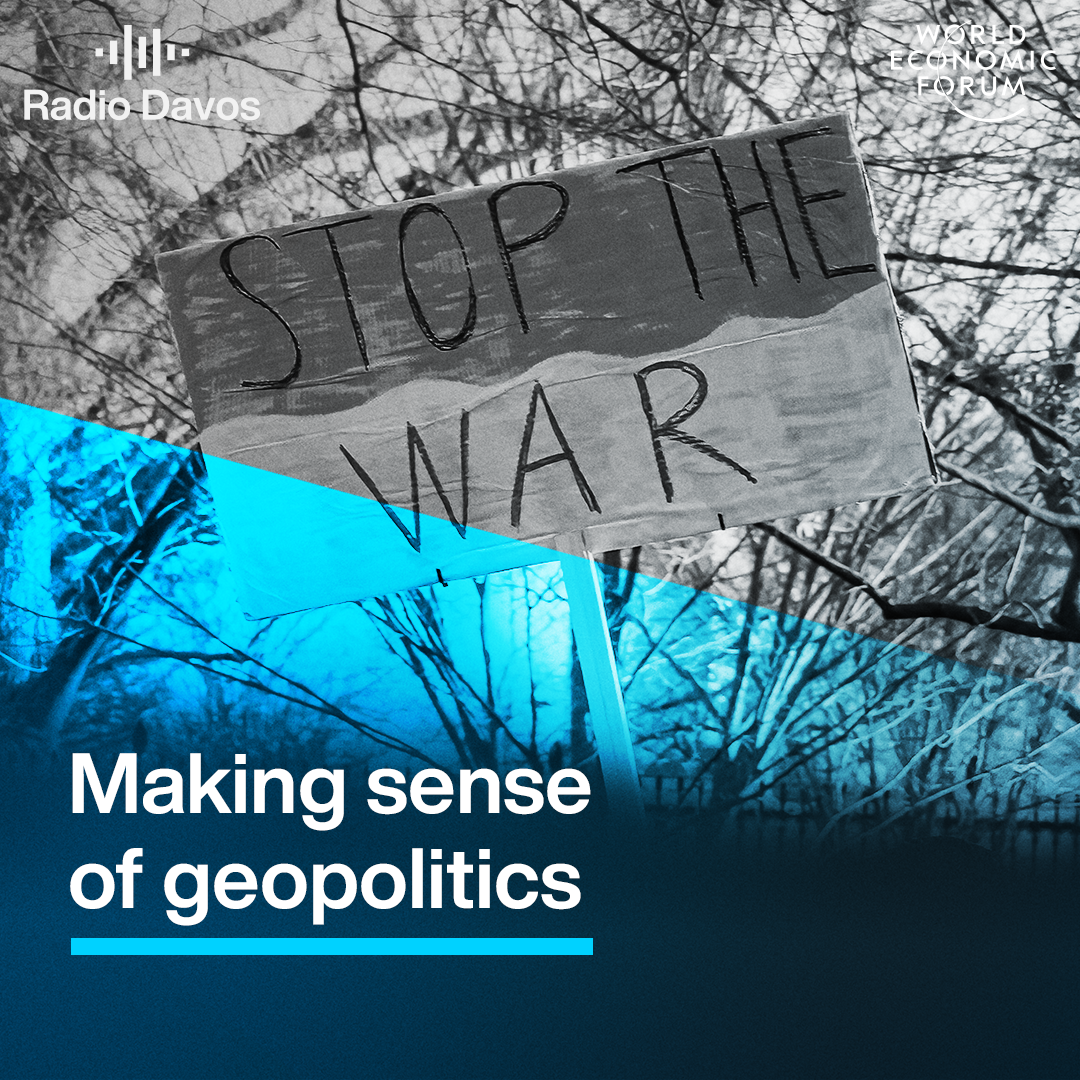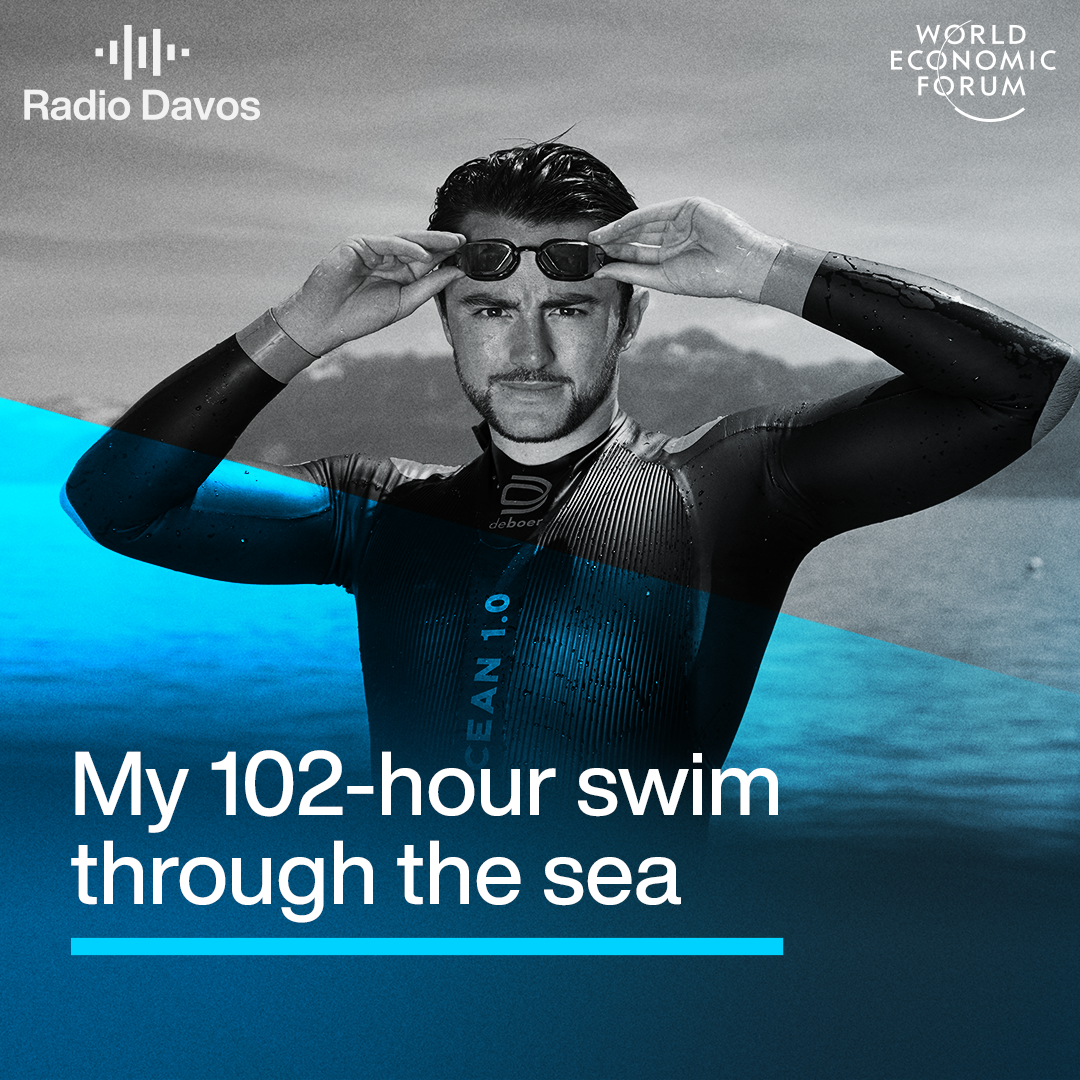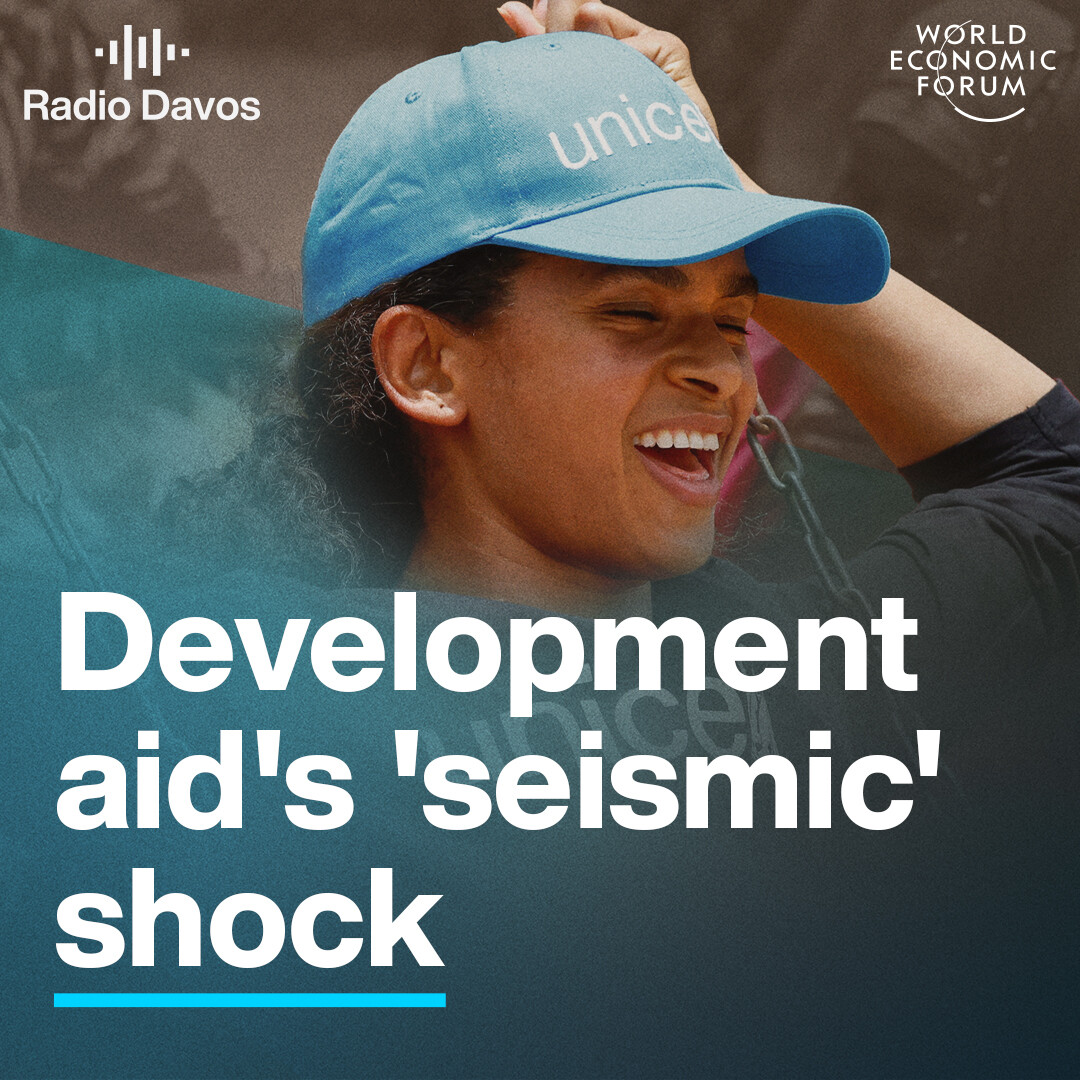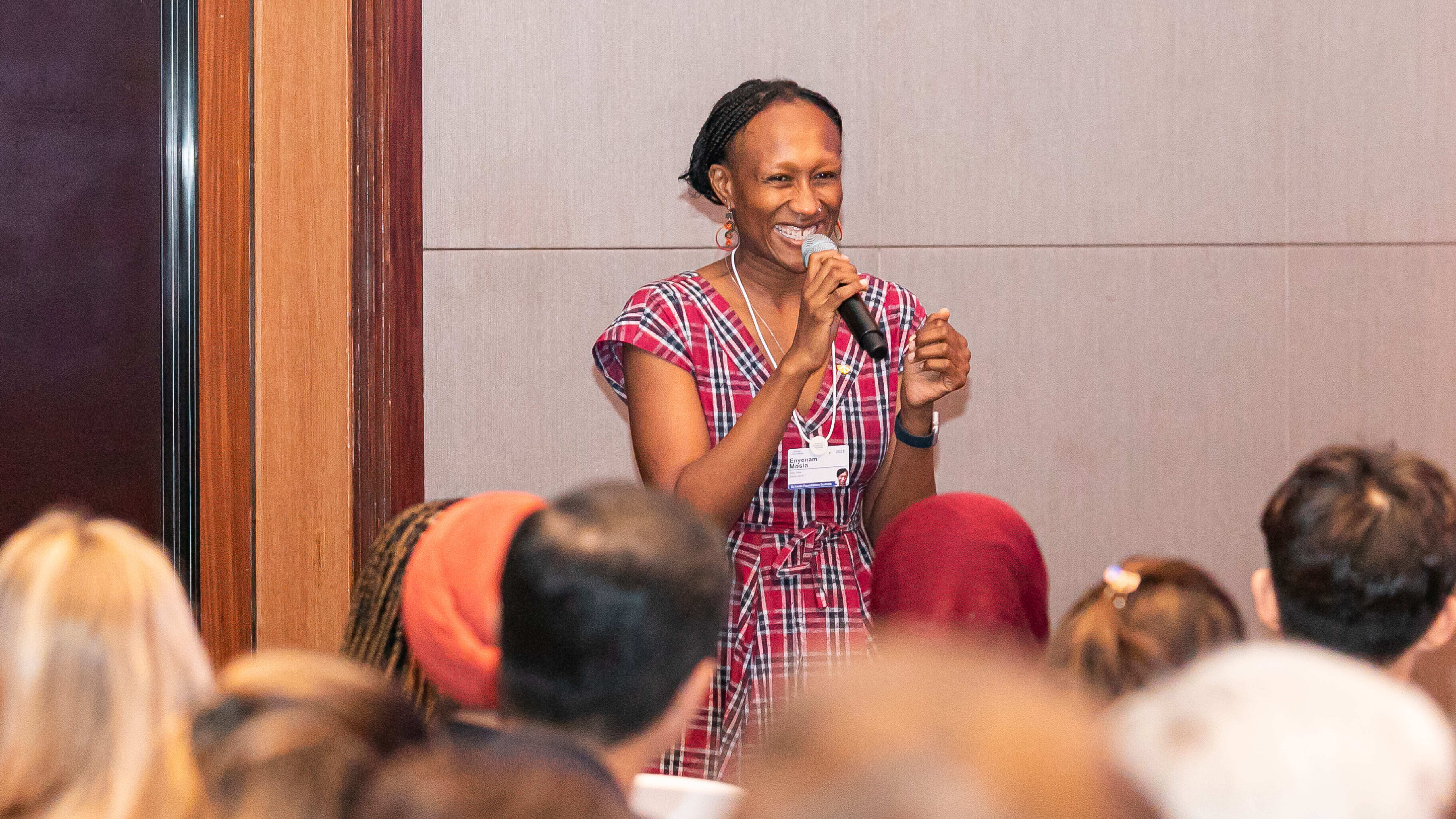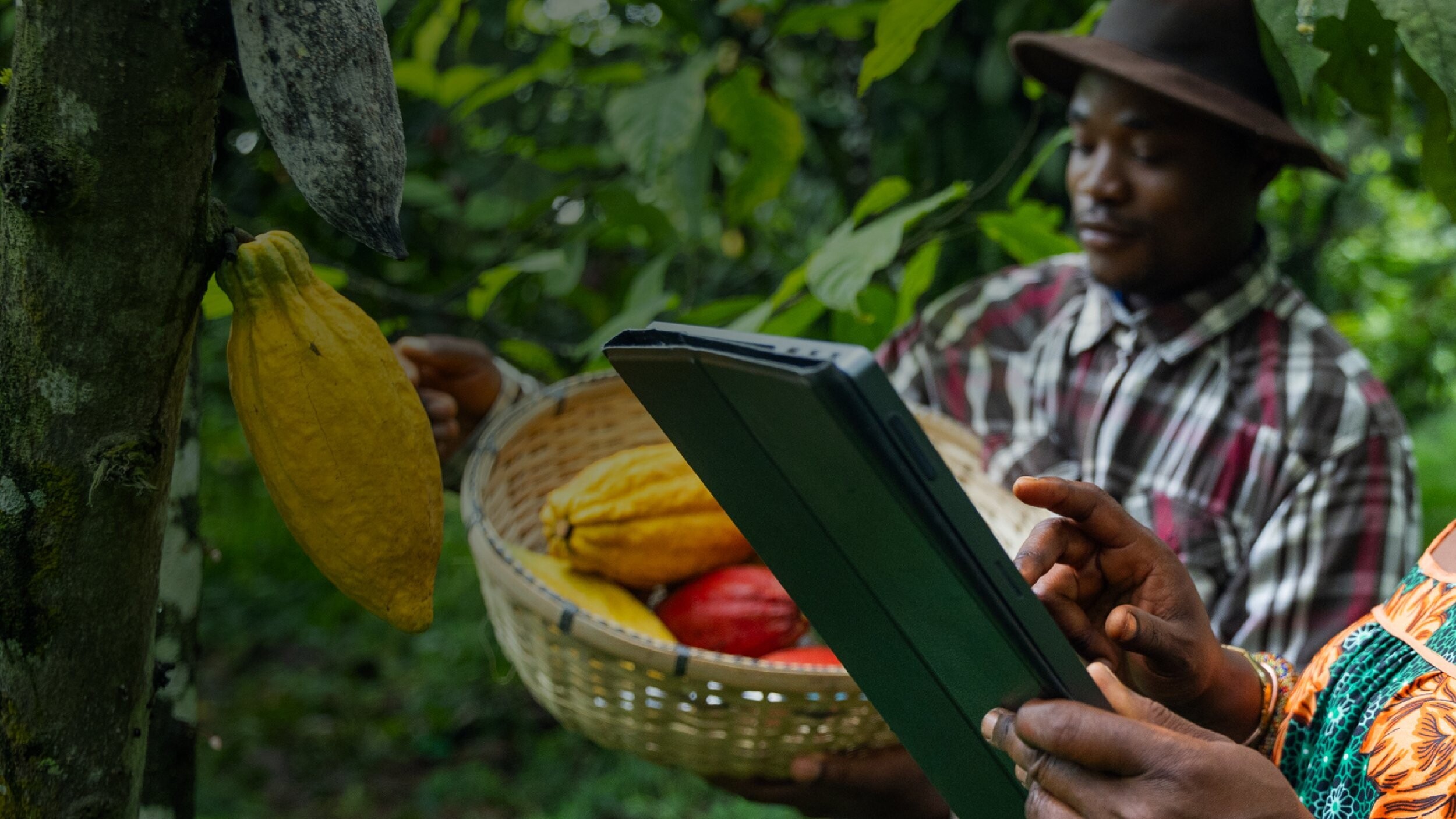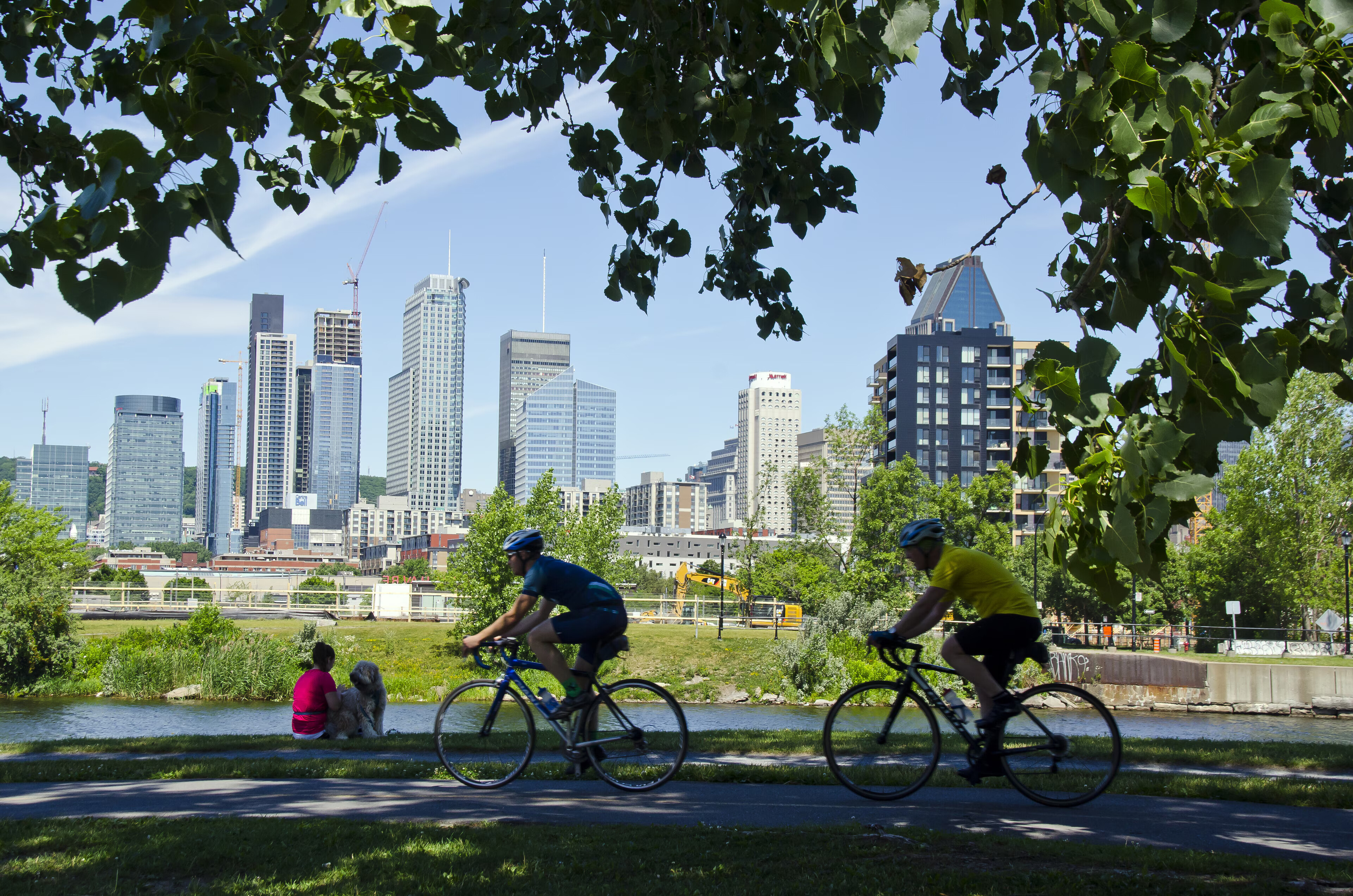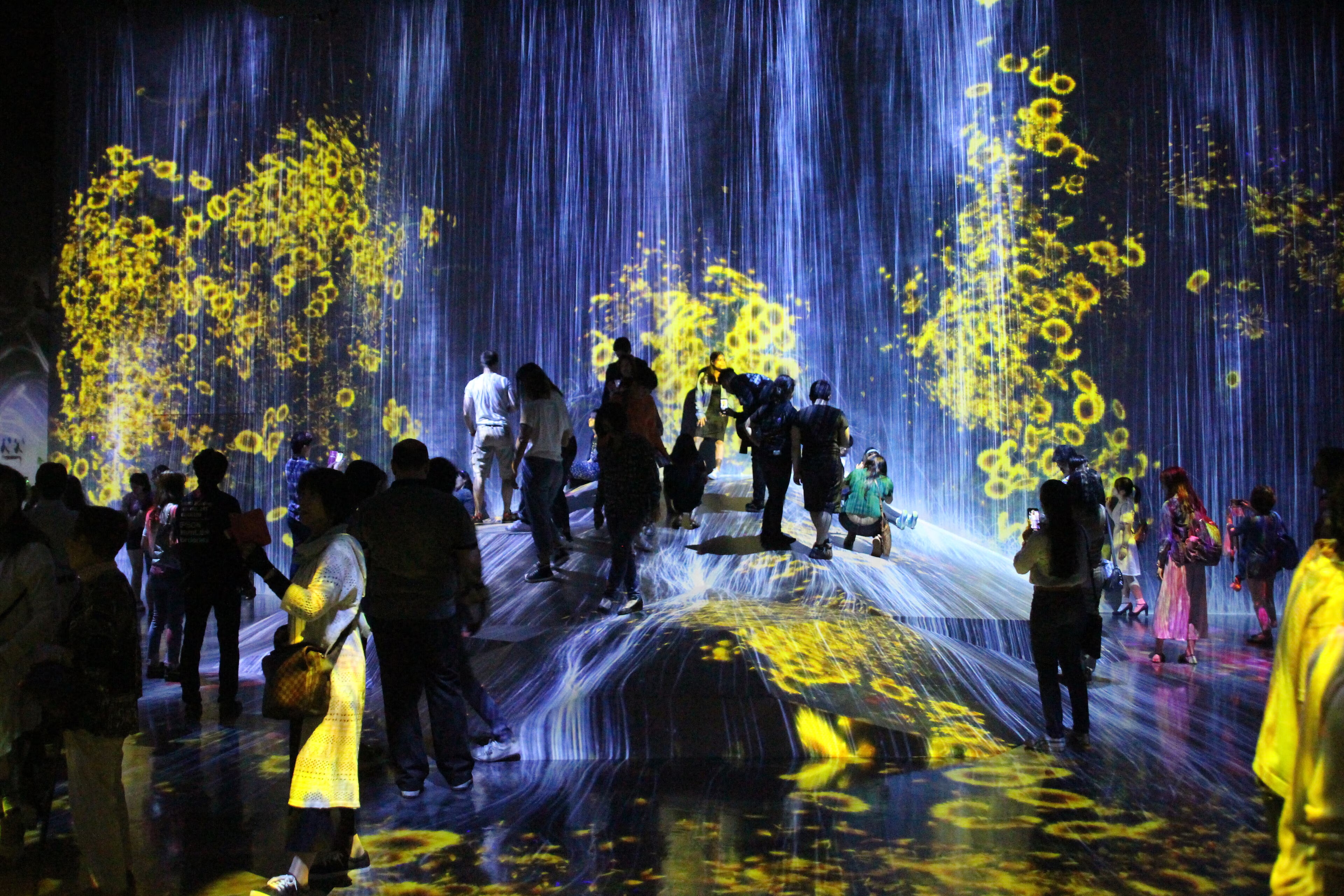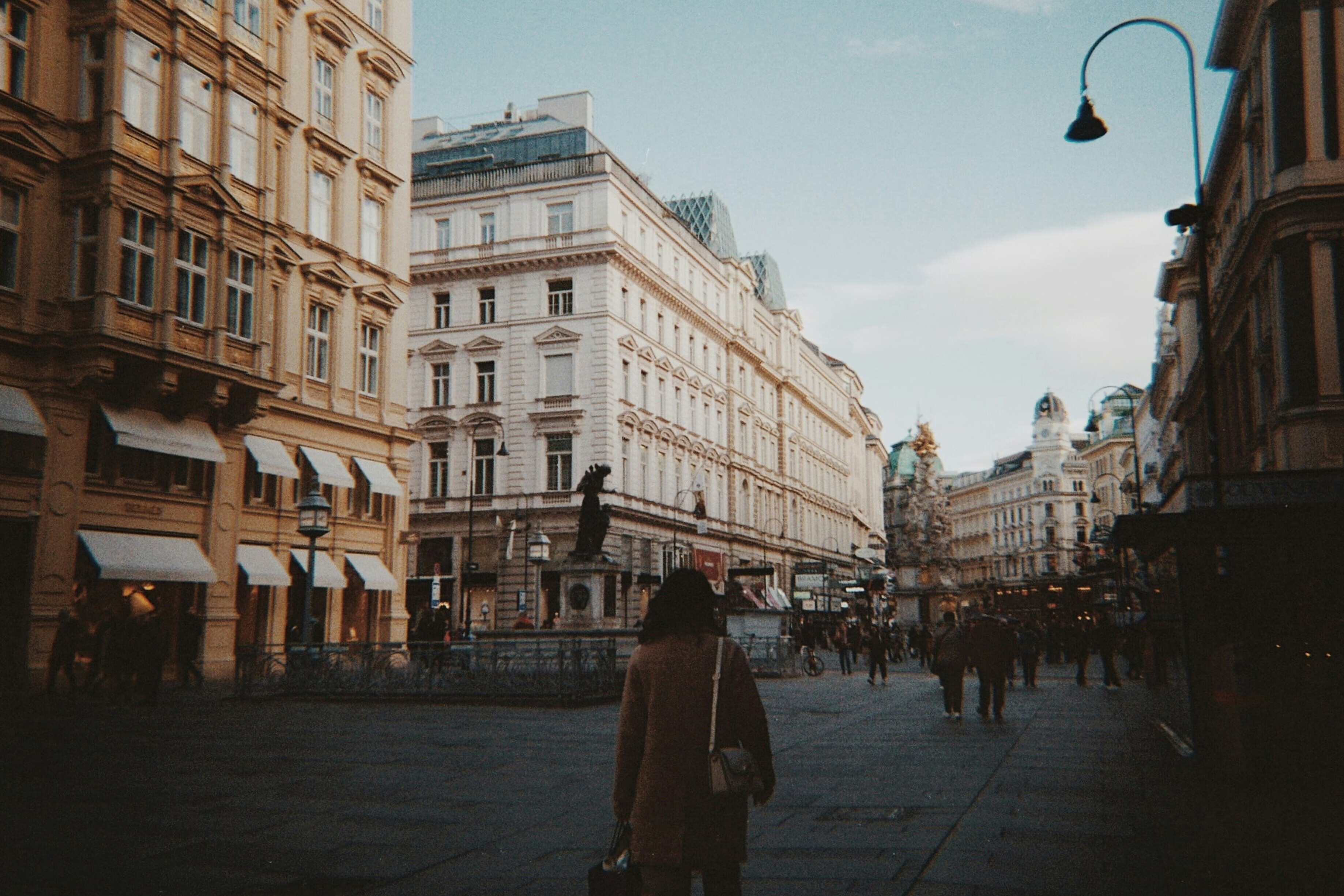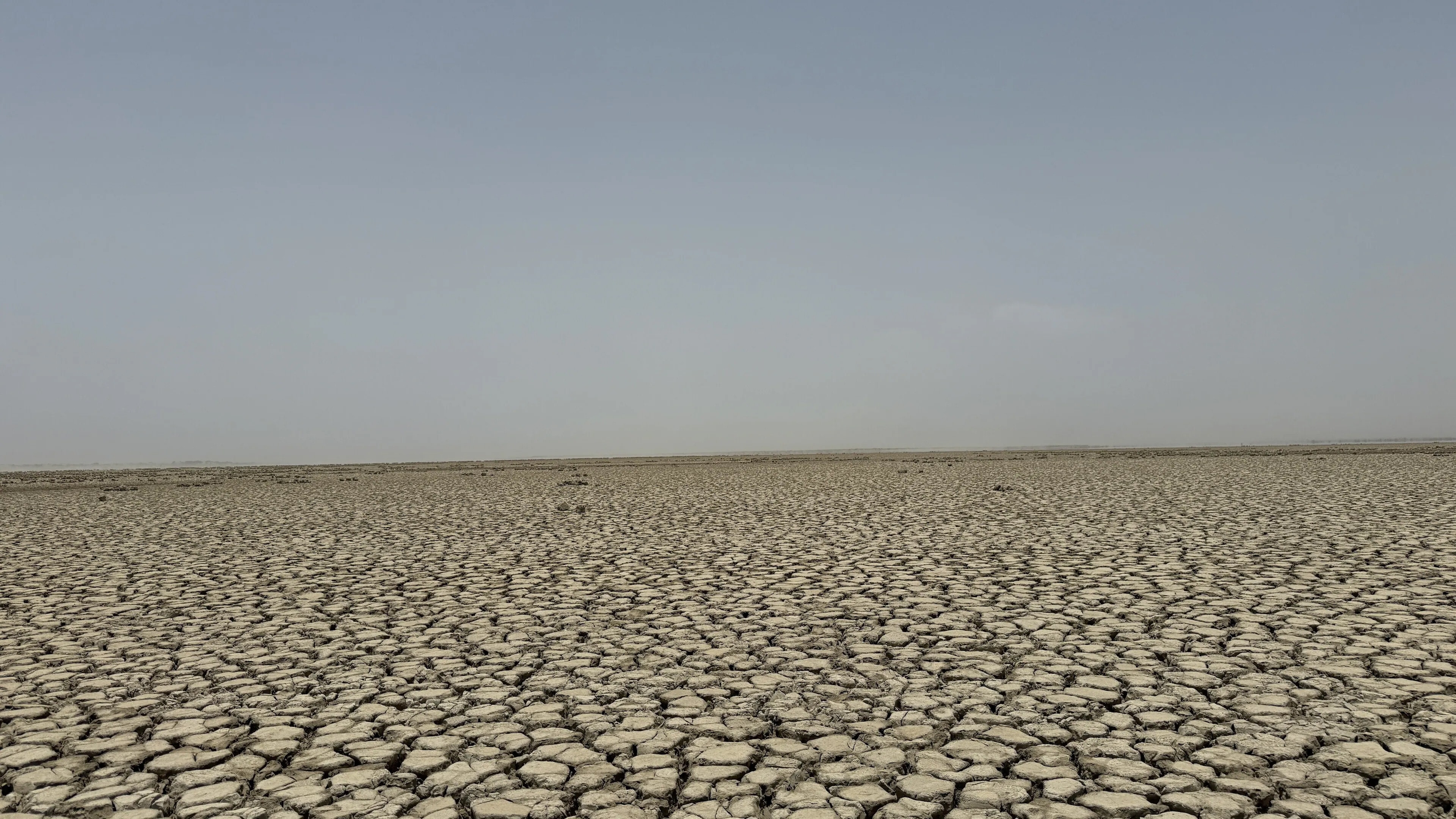How sport can change lives: the real life story of the Homeless World Cup
"The Beautiful Game" is a feelgood movie about a football tournament between teams of homeless people from around the world, with the upbeat message that sport can change, even save, lives.
We speak to, Mel Young, the man who created the real-life Homeless World Cup, an annual event aimed at lifting people out of homelessness.
Related podcasts:
ポッドキャスト・トランスクリプト
Bill Nighy (Mal): So, the football competition's street soccer, forest side, really fast. Some excellent players, all homeless.
Micheal Ward (Vinny): Homeless?
Bill Nighy (Mal): Yeah, all Homeless. It's called the Homeless World Cup. There'll be players coming around from all over the world...
Robin Pomeroy, host, Radio Davos: Welcome to Radio Davos, the podcast from the World Economic Forum that looks at the biggest challenges and how we might solve them. This week, as the women's Euros are under way here in Switzerland, we take a look at how football can change the world.
Mel Young, co-founder, Homeless World Cup: Our purpose is really to get people off the streets and end homelessness. That's what this is about. So we're using football and sport and the power of sport to change lives.
Robin Pomeroy: We talk to the man who invented The Homeless World Cup - a global event that speaks the universal language of sport.
Mel Young, co-founder, Homeless World Cup: As soon as they start playing football, you forget they're homeless. And I said, yeah, that's the whole thing you do, they become footballers. And they're footballers and that changes their whole psychological view of themselves.
Robin Pomeroy: The Homeless World Cup, which this year happens in Oslo, Norway in August, has inspired a movie, The Beautiful Game, a feelgood film, starring Bill Nighy.
Bill Nighy (Mal): Every player has a story to tell. Heartbreaking, unexpected, thrilling stories. And they tell those stories in one great universal language. And that's football.
Robin Pomeroy: Follow Radio Davos wherever you get your podcasts, or visit wef.ch/podcasts where you will also find our sister programmes, Meet the Leader, interviews with some of the best thinkers in the world, and Agenda Dialogues, the full audio from World Economic Forum events.
I’m Robin Pomeroy at the World Economic Forum, and with this look at the Homeless World Cup and the movie it inspired.
Mel Young: Come and watch the Homeless World Cup event because it's the way the United Nations should be. This is the way human beings should be, the spirit between them.
Robin Pomeroy: This is Radio Davos
Robin Pomeroy: That was a clip from The Beautiful Game, a movie based on the real life event called the Homeless World Cup, a football tournament played by teams from around the world whose players are all homeless.
In the film, Bill Nighy plays the England team coach who takes his team to the championship in Rome. It's a feel-good movie that leaves you with many questions, not least, is the Homeless World Cup a real thing?
To answer that question, I'm joined by a man who co-founded the event two decades ago and who is still president of the Homeless World Cup, Mel Young. Hi Mel, how are you?
Mel Young: Fine and good to meet you.
Robin Pomeroy: It's great to meet you. What is the Homeless World Cup?
Mel Young: The Homeless World Cup is a very simple thing. We use football, our ball and take it to where homeless people are in the world.
We work in over 70 countries in the world and homeless guys kick a ball around which is very easy to do. You don't have to be any good at it. You can be good at or not so good at it. It doesn't matter.
And then once a year a team is selected to represent the country and it's hosted somewhere in the world and we play football for eight days, a short form of football.
It's a fabulous event, people come to watch it, people love it.
But our purpose is really to get people off the streets and end homelessness. That's what this is about. So we're using football and sport and the power of sport to change lives.
Robin Pomeroy: In the film, for people who have seen it, it's on Netflix, they all go to Rome and they're playing street football. I looked up street football, it is not officially a thing, is it? What is the type of football these players play?
Mel Young: Yeah, we invented it quite quite deliberately to fit where the homeless guys were. So that the game we've invented is four a side with eight on with rolling substitutes okay and it's seven minutes per half with a minute in between so it's a short form of football.
We invented this game quite simply for two or three reasons one we wanted the short game because we wanted to create pitches where homeless people were so we could move them around to where they actually were rather than saying hey we've got to go to 11 a side pitch which is 10 kilometers away or whatever. And, secondly, a number of our homeless guys, particularly in the beginning, aren't so fit and maybe can't run around for 90 minutes in the full game, so we wanted to create something that was shorter.
And we wanted something that's quite exciting. So our whole strategy here is around creating a sport or a form of football which is inclusive.
So the way we do this is, we don't have to be any good at the game particularly and some of our teams aren't so good and some can be very good.
So come to the event, we've got 48 in the men's competition and 32 in the women's competition, and what happens is that everybody finds their own level during the week so if you lose you don't go home. The not so good teams end up playing 48th, 47th place, 15th against 16th and there are different cups and at the end everybody gets a medal.
But some of the games end up being really, really exciting. So the format we've created really works.
So I've seen a team being two goals behind with 30 seconds to go on and losing three goals in 30 seconds. So it becomes very exciting and compelling to the crowds. The crowds get into and get really excited.
And so, as one of the media guys who came from Reuters at the very first event, he said to me, see as soon as you start playing football, you forget they're homeless. And I said, yeah, that's the whole thing you do, they become footballers. And they're footballers and that changes their whole psychological view of themselves.
Robin Pomeroy: As it's portrayed in the film, these games are being played in Rome around the back of the Castello Sant'Angelo. I looked up, I don't think you've played it in Rome, have you?
Mel Young: No we've not played it in Rome, we've been all over the world and we deliberately want to be around the world so we can showcase what we're doing and cities bid to host it in the same way they do for the Olympics and so on. But we've been in Rio and Mexico City and in Santiago, we have been in Melbourne and Cape Town, Amsterdam, Glasgow and this year in August we are in Oslo.
Homelessness manifests itself differently around the world, but it manifests itself, and so we go to different countries and showcase our event and show, hey, this is solutions to tackling the problem.
But the movie guys wanted to make it in Rome, and as you know, if you've watched it, it's a fictional movie, so it was fictional. But hey, that was a wonderful venue in the movie, so maybe we would like to be in Rome one day.
Robin Pomeroy: So it was Seoul last year and Oslo in August this year, 2025. Does it reflect, I mean, is that what it looks like? You saw a small crowd, but excited supporters watching these games.
Mel Young: Yeah, it is. I mean, really, to be fair, it's a fictional movie, and we kind of signed the rights over to them so they could do what they wanted with it. But they've stuck pretty closely to it, actually, so both in terms of the characters and in terms of the event.
We would probably get much bigger crowds. I mean the biggest crowds we've had was 167,000 people came to watch from Mexico City in 2012, which was incredible. So that's not all at once, but over the eight days, which is incredible. And if you think about it, you know, that's people coming to watch homeless people play football. It's incredible. So maybe because of just the restrictions maybe in the movie didn't show maybe what the crowds can be, but we've had some very, very big crowds. But overall the movie was pretty representative of what we're about.
Robin Pomeroy: So what does it achieve, do you think? You know, you're giving these people a week kind of out of their daily life, which I imagine is quite a struggle for most of the people involved in this. That's great. But above and beyond that, what are you achieving?
Mel Young: I mean, yeah, exactly, we would always say come along to the event because it's magic and it is and I promise that even people who don't like football kind of like what we're doing. So there's something going on that's quite special.
But if it was just that, we wouldn't do it because our purpose is about kind of moving people on and... So, to be clear, we just haven't taken people off the street the day before and then they're now playing in a, they've been in programmes that our partners run around the world and getting to the point where they're ready to kind of move on, so beginning to get into house, beginning to look at a job, finally come off drugs or the last part of it, and this is the final push.
And so, as far as we're concerned, that's our... Raison d'etre is using it to end homelessness, and it works. I mean, all the research we've done is showing 80% of the people involved with aren't homeless anymore after the event and so on, and that is a really, really important statistic for us and what drives us on what keeps us working hard, keeps us focused.
And of course, we've got hundreds of stories of individuals who've, you know, we have the statistics. We've worked with 1.5 million people since we've started. But behind that there's a story with everybody, but interestingly a lot of them come back to the programmes and volunteer as coaches, some are even running the programme, so former homeless guys, and they're very important because when homeless people are talking to me they say, oh you don't know what it's like and where I am, it's terrible. And they kind of say, yeah, I do, I used to be you. And that is actually a really inspiring moment for those people to think, hey, well, I could do this.
And so there's a kind of circular feel that's been created now since we started.
Robin Pomeroy: And I'm guessing in addition to helping, working with, homeless people in those programmes throughout the year, also there's an awareness raising thing.
And that particularly comes through from the movie because you're watching that. It's a feel-good movie. It's, I guess it's a comedy in some ways, but there's some tough. you know, you mentioned just now addiction, that comes up, it comes out almost out of the blue, really, the way that it's done in the movie.
Do you think getting people to understand what it's like to be in the shoes of someone in those, and in very different positions, because it also highlights in the film, it could be quite different for someone in London to someone in South Africa, someone in Tokyo, to be homeless, different stages of that, different ages, different reasons for being homeless. Is that kind of awareness a big issue for you?
Mel Young: Absolutely that's one of the things. Obviously our focus is on the homeless people themselves being not homeless. That's our key objective.
A secondary one though is about changing the stereotypical views.
The stereotypical view is that here's some beggar in the street who's looking down with his hand out and he's homeless. Homelessness manifests itself in all sorts of different ways and it has different definitions in different countries. We at one point tried to have an international definition which we sat for three whole days trying to work it out. We couldn't do it. And so the way we work it is we work with our players as per the definition of homelessness in their country.
And so in England, for example, if you're in a homeless hostel, you're homeless. In some African countries, if got any shelter over your head, you are not homeless. But we respect the definition of homelessness per country. And that works out. All of our partners kind of accept that that's the way we work. It's not perfect but we can't ever get a perfect scenario but here it works.
I think for us this is a very important part, this changing of the stereotypical view. We've done research into it again about people who've come to watch. And they would say, a lot of them, they would never look at homeless people again in the same way. After coming to the event, if they saw somebody in the street, they'd think, could be a footballer, you know, could be part of this, could be the change, and that's very, very important.
So, the movie coming along therefore, and it's been watched by millions of people in 187 countries, the feedback, we get, people just like the movie, a bit like you're saying, it's a feel-good movie. People like it, people are saying, we enjoy that movie, whether they like football or whether they're into social issues or whether just like movies, they like the movie.
And that's very, very important to us because you are beginning to get behind some of the issues that you're describing, getting to people understand, oh, actually, that's a person who's become homeless that way. And here's another one maybe around drugs and here's another one, maybe around family issues or whatever it is. And getting that understanding is so important, I think, for people to understand and then have much more empathy with. Because as soon as you start saying, oh, that could be me, or could have been me, actually then you become much more connected to the person.
So the movie, although it's fiction, you know, it does, it's really good, I think, because it does kind of mix up that really tough, hard issues that are going on obviously around homelessness. But there's a lot of comedy in it as well.
And that's our experience. I mean, some of the times I've been with homeless people over the years, I've had some of them, the best laughs going. And we have, you know just, it's just really good, and that's about life and it reflects it.
So even if we're working in these very difficult circumstances, we are able to laugh and that is what we can build on relationships, if we can laugh together. And the binding thing for us is that ball pulls us together.
Our players can't even speak the same language. It was even happening in the movie behind the scenes, interestingly, you may not aware, but a lot of the players out there were former homeless players that they brought on to take part in the teams. And so the actors then behind, in downtime, and there's obviously a bit of downtime when you're making a movie, they're all now talking to these guys and they're interacting, kicking the ball around, getting to know each other and so on. And so that's what happens.
And there's lots of examples of where you get, where people might have been, I'm never going near a homeless person, or a homeless person's never going to near a rich powerful decision maker. And they never have a chance to speak to another, but put a ball down between them and all of a sudden you have a communication.
Robin Pomeroy: So the movie, I guess there's two main characters. There's Michael Ward's character who is a young, good footballer who gets almost spotted just in the park by Bill Nighy's character, who is the coach, and he's clearly trying to enlist him. And it's quite interesting as we see the things really through those two characters' eyes.
And Michael Ward's character, He almost doesn't realize he's homeless. We don't learn that much about him, but he's estranged from his wife and child, and he's living in his car, but he doesn't actually classify himself as homeless. Maybe we could just hear a clip from that as he's meeting the other players on this team, and he is just kind of in denial about his own situation.
Movie clip, team member: Honestly, I think you're the best football player I've ever seen, right, except on the telly. Do you think that... You're a great striker.
Team member: We've got a great striker. Namely me. Mal picked all of us.
Micheal Ward (Vinny): I don't qualify, because this is the Homeless World Cup. And I am not homeless.
Team member: We just assumed.
Micheal Ward (Vinny): Yeah, well, I've got a car, a job.
Team member: What, what job?
Micheal Ward (Vinny): Logistics. Good luck, yeah?
Team member: Embarrassing, that. You thought he was homeless. He's just a bit of a twat.
Robin Pomeroy: So that's a clip from the movie.Where did it come from? You've been involved with this for, what, 20 years? Is that right? I mean, how did it... You were a journalist before that, right? Was your interest homelessness? Was it football? I mean how did all come together for you?
Mel Young: Well, I'd been working with homeless people because we've done street papers and, you know, that's my journalist input.
Robin Pomeroy: To do with the Big Issue, is that it?
Mel Young: Yeah, the Big Issue in Scotland, yeah, which got around from Scotland. And it had been successful and other street papers had been started up around the world and then we were able to get together once a year. We created a network of street papers, we didn't have much money, but we were able to meet together. So we met together in Cape Town in 2001 and it was a great conference.
Robin Pomeroy: It's a conference of the people producing these papers?
Mel Young: Street papers, yes. So we're either founders or directors or editors. And what was good about it was we were able to kind of share experience and, you know, sometimes it was difficult for lots of people to be able to share, this is how we overcame XYZ. So we support one another, learn from one another. Talk about how we might do things together.
And so at the end of this conference which was really inspiring I mean it was like we all felt that yeah this is really good we'll do this once a year this kind of gives us an adrenaline shot well this is good for us.
But then after that I was having a beer in Cape Town with them another of the street paper editors a guy called Harry Schmidt from Graz in Austria and we were, great conference this really good inspiring positive but there's no homeless people here I mean we just all editors and so on I mean how could they experience what we're experiencing. So we were throwing ideas around I could do a conference we didn't think that would work and we had an impact and then exchange some sellers and then then there'd be issues about visas maybe or employment status or and then a language.
And we said, well there is an international language is called football. And we were both into football. I love football. And he also loved football and he played semi-professionally and so on. I hadn't because I'm over there. But we both loved it. So we started mucking around over a beer. And I said, look, there's some of the guys in our paper in Scotland, they kick a ball around. They could be Scotland. We'll make them Scotland. And he said, oh, we have the same. So, we'll be Austria. So we shook hands and said, right, it's going to be his game then between Scotland and Austria. And I said, Scotland will win, because we never win at football, but you guys, OK? This is just what's going happen. And he's going, no, our neighbors are Germany, and they win everything, and we'll beat you guys. So we were mucking around like that.
Robin Pomeroy: Who won? Did you make it?
Mel Young: Well, let me tell you. Let me finish the story. So then we drank some more beer, to be honest, and then we said, well, why doesn't everybody come? Not just us. We invented the Homeless World Cup over that beer.
But then the next morning we met again over breakfast in the hotel where we were staying, and we said that was just a wonderful conversation. Will we leave it in the bar or will we do it? So sometimes people talk about it as that moment, the creative moment, but I think probably the breakfast was the critical thing because we said now let's do this.
So then we made it happen over the next 18 months, okay? And we had the first event in Graz in Austria. Everybody said we were mad, this wasn't gonna work, et cetera, et cetera. But it worked.
And one of the games, of course, because this is the way sport goes, okay, the draw, draws Scotland against Austria. Of course. In one of the first games in a section. And so Scotland played Austria and Scotland won. But the way the competition went, Scotland then didn't do so well and ended up in not so good position, but Austria managed to get to the final and won. So there's a picture of me and Harold shaking hands together because we both won the game and Austria won.
And it was magic for that country of Austria at the time, it was just a beautiful event in Graz, and we were only going to do it once, but from that moment, because of the research we did into what was happening and what happened there, that was the beginning of when we started moving around the world.
Robin Pomeroy: You mentioned this idea of a kind of universal language, and you can drop a ball between two people who otherwise wouldn't be able to communicate. I think the film brings that out as well, and I think it has a lot to say about masculinity.
You've got these men, and on the England team, it's all men. We'll talk about women in a minute. These men, some of them find it difficult to communicate with each other. Not necessarily because they're homeless or because they've got addiction problems or whatever, probably just because they are men. I mean that really, for me, really strongly comes through the film. Is that something that you've found over the years that just men find it difficult to communicate but sometimes, whereas, having a beer is one way or throwing a ball at their feet is one way of just getting them to open up with each other, communicate.
Mel Young: I think probably yes. I mean, I think the issue for us working with homeless people is that you are, you end up very isolated on your own. You're concentrating on how I'm going to get to tomorrow, you know, where am I going to eat, where I'm going to sleep etc etc. So in a sense you become quite self-centered and selfish. Not that I'm saying homeless people are selfish, just that's what happens.
And then when you get to be part of a team, which is what we're trying to do, build people into a team which is part of the family, you do start to open up a bit. And you have to speak to your fellow teammate about how the ball's going to be passed or are you going to the goalie or whatever it is. And that simple means of communication being part of the team is so powerful in the first part of what we're doing, that psychological change and it is about communication.
And I do think actually men do have an issue around this actually about talking about their feelings, I think it's universal but I think the football and what we are going to get people open up and what I find with homeless people or people who have been in this situation, when they open up then they really open up. So much more than any of us who are not homeless, by the way, you ask them what their issues are and they'll tell you exactly what's going on and sometimes in detail. And then they're sharing that and they start to open up as well. And that is part of a kind of healing process because... You know, being homeless is very damaging and to be able to kind of heal through the football and talking with teammates.
One other aspect to this which is fascinating, there was all sorts of things, we came up with this idea that there were all sorts things we didn't kind of know were going to happen, is that the way the teams kind of are with one another, so they can't speak the same language but they really respect each other.
And it's a contact spot and they want to win the games. But afterwards, you know, you lose a game for a minute or so, you're not happy about this. But actually then the teams come together and it's almost like everybody around the world, they all know that they've been in this situation of being excluded from society, although it's different from country to country, and they're all part of the same family, and then they're really together. And that there is a kind of universal bond between them.
I always say to people, come and watch the Homeless World Cup event because it's the way the United Nations should be. This is the way human beings should be, the spirit between them.
I remember one time it was an anecdotal story, just to illustrate this. We played in Cape Town in 2006 and the Danish team were going down and the coach was telling me this story. He said the players had said to her, well we're the poorest of the poorest, nobody worse off than us. She was going, well I think you'll see when you get to South Africa and some other teams that you're not and they said, no this isn't possible. So on the very first day they were in South Africa and there was a visitation out to some of the townships and they quickly decided that actually they weren't the poorest people and they started giving, people had given them little presents to take for the event. They started giving their stuff away to people, you know, to the other team and so on.
And then the South African players said, we didn't realize anybody who was white could be homeless.
So, immediately then, if you look at that story, you've got a juxtaposition of people kind of going, thinking they were in the worst possible position, but understanding that other people were possibly in a different position, and it changes your whole perspective.
Psychologically, all of a sudden, you're in a new place, and that's what the Homeless World Cup does. It puts people in that different space. So it's rather a long way of answering your question, but actually that getting men to open up and understanding where they are happens through our event, and it's important.
Robin Pomeroy: And women then. In the film, the US team, I think, is all women. In the real-life event, are women involved? Are they mixed teams? Are they separated? How does it work?
Mel Young: In the real event we have a men's and women's come as separate, it wasn't always such and the women's games really developed.
Robin Pomeroy: I was going to say, in 20 years, 20 years ago, in Europe, certainly, it was a man's game, right? And now, in 2025, you're about to see the Euros hosted in Switzerland here. It's a massive thing now. And of course, in the US, it's always maybe a more feminine game than it's seen as in other parts of the world. So the game of football has really evolved over 20 years hasn't it?
Mel Young: The game of football has really developed over the recent years, yes, and that's really good, but within ours also.
So the history of it is, in our event, to begin with, when we started, we were really focused on young men, because we had other ways of working with women, which were working okay, but these particular young guys, they wouldn't move for anything, like we were trying desperately, until we said, do you want to play football? And they went, oh, yeah, we'll do that. So our focus to begin with was on the young guys.
And in our first event, I think there was three or four women. So we allowed women to participate. So Brazil brought a couple of women because they were used to playing football on the street and they were working with the women and so on.
It was that way to begin with. And then we decided, hey, look, there's a bit of a demand here for women. So we'll have a women's event, which we had for the first time when we were in Melbourne in Australia. And it really worked. So we've kept doing it.
What's interesting, I think, is that the way the women come together more, so we were talking about the men molding together as a team. I think it's interesting that women mold together better as a team quicker. They support one another. And I don't, maybe that's a kind of cliché or something or whatever. I don't necessarily have any evidence, but what I see.
And so we want to build the women's events. But what we're finding is that in the women's events is that in cultures where the women are used to playing football or play on the street regularly, so particularly the Latin America, South America, they're winning the events now, so I think Mexico have won it for the past eight or nine years because they're just really good at it, whereas the European teams aren't so good at because culturally in the past they've not been used to playing so much on the streets or whatever, they'll start to catch up I think over time.
So, we have a big focus now wanting to develop the women's game more, get more women involved. Again, our purpose really is taking the ball to wherever there's homelessness and getting a solution, so if it creates a solution for the women, then we'll focus on the women.
So the current way it works is that a country can bring two teams to the event, men and women, so it has to be all men, all women, but if you can only bring one team, some can only afford to bring one team and you can put in the men's event you can have a mixed team in the men's event so it allows women to participate for the country if the country wants.
Robin Pomeroy: It's a big event. A lot of organization must cost a lot. Where do you find the funding for it?
Mel Young: We try and keep our costs down to a minimum as far as possible. We've got a lot of volunteers who work with us around the event, and we've got lot of pro bono support.
But the way it works is that the host country pays for the events, so they bid to host it. So it's a bit like the Olympics or some of the big sporting events. And so they will be responsible for paying for our annual event for all the accommodation, all the food, the building of the stands, the marketing within the country. That money will come from three sources generally, government, city government, or national sponsors. Sometimes that splits a third, a third a third. Sometimes it's all of one. So when we were in Paris, for example, it was all government. When we were Mexico, it's was all national sponsors.
In a sense that doesn't matter to us as long as the costs are covered.
So we'll sign a contract then centrally for the host city to do that and then they fund the event in that way. Then our central funds which we try and keep -- central costs -- we try to keep a minimum so we don't have to spend our entire time fundraising come from various sponsors from the rights fees we get and so on so that we are actually the the catalyst, if you like, sitting centrally that's making making it happen.
Where we want to go now though is post a movie actually because there's been so much interest in this. We want to really grow the organization. Simply because the more places we can get to, the more impact we can have, so we're looking for sponsors and investment right now to build the organization a bit. But around the same principles really, the volunteers that we have, some of whom come every year from across the world to support us, are brilliant people and we want to keep that base and keep that atmosphere around the event, but you know, we probably need bit more cash to help us do more.
Robin Pomeroy: I'd recommend people visit the website as well, because one of the things on there is, it talks about the movie, which as you keep mentioning is a fictional movie. You think, well, who are these characters? And very nicely on there, they said, these are composite characters in the people who've written and directed the film. And they'll show you the real people who have shared some of the stories.
You've worked with these people over 20 years. Are there types and archetypes of homeless people that come through in the film? You watch that and say, ah, yeah, I've met a dozen of those. Those personalities, all the stories behind them.
Mel Young: The movie does really well and captures it, I think. You know, there's some things, of course, which aren't correct. So you never take the one player, Michael Ward, from the street on straight into a team, I'm saying, for example. But, you know, the story is right. And it's fine because it captured him as a character admitting, you know, saying he wasn't homeless when he was. And that's that's a really good story and central to it. And it is absolutely fine.
The thousands of people that we've worked with, they're all different, they all have different stories, they have different situations that have emerged for them. And so there's no one kind of stereotypical view to be honest.
But if you go back and have a look at the kind of causes, and this is where I would get into a whole discussion with governments and institutions about prevention strategies. Have a look where people are coming from, and you'll find it's the same issue.
So a lot of people ending up homeless who have been in the care system or been in young people's hostels and so on, a lot people who have being released from the military end up being homeless.
So if you have a look and have a look at those you can start to say well this is how we can actually stop them coming onto the street in the first place by creating prevention measures.
The issues really are one about exclusion and people falling off the edge and there being no safety net and as a result they just end up in a very, very difficult situation, but are able to get themselves out if you provide the right tools.
Robin Pomeroy: So, the right tools, I mean, you must talk to policy makers as well in your work. Are there things you say to them, you know, here, these are the policies we would need. I imagine there must be lots of different policies which are needed, and it may vary on the location and the particular need you're looking at, but is there kind of one clear thing that policymakers are always missing.
Mel Young: I think that there are. I think governments that you speak to, policymakers, they kind of get the issue, whether it's a priority to them or not varies.
Some countries are actually totally denial them, say there isn't a problem, and there is.
My view at the moment, and developed over time, is what we've got here is a system failure globally that's creating this. And so obviously to any policy member at the moment, fix the system. And so we do what we can do, okay, as Homeless World Cup, and we've worked with thousands of people, and people give us awards and make movies about us, which is lovely, please give us more awards, blah, blah, it's just great. But the challenge that we have is that as soon as we move one person, another person comes to take their place. It's never-ending. And so what we actually want to do is end homelessness altogether.
So I don't think there should be any in the world. How have we created a world where even in the richest countries in the world, you've got people lying around in the street. How have we created that system?
So that would be my first point to any policy maker. How can we end this?
I will then explain to them, and there's plenty of studies that show us how expensive homelessness is to society, to governments, to everybody else, how expensive this is. Quite apart from the damage it does to the individual.
And so how can we begin to change?
Now let's have a look at the policy so I say first of all like homeless prevention should be a key thing that governments can get involved in doing so they are responsible for release from the military release from prisons release from care institutions etc etc if they can be impactful in that area.
I think at the moment what we need are not the usual suspects coming to the table, so people from the private sector, from the insurance sector, the housing sector, and the finance sector, to hey, can we get your brains around this and start to think about some of these what are intractable issues here and try and create solutions.
Obviously, it's around housing is one core part of it, obviously, but a lot of people think it's the only thing. To me, I always say there's a difference between houselessness and homelessness. Homeless is different from houseless, but you have to sort some of the houses. That's part of a kind of policy, but how do people live in the houses and what does home mean, et cetera.
I would be looking in these areas urgently, if I look at the west coast of the US at the moment, which in some ways epitomizes what's going on, huge numbers of homeless people. Local people there see it as a major issue, like what's gone on here. The authorities are, to be fair, spending a lot of money trying to sort the problem, but they're not sorting the problem.
So it's not just about putting money into this, and I'm not saying they shouldn't spending money by the way. It's actually about having a look at what the system is that's causing this in the first place. And of course It's all kind of all that is connected. It's not about the homeless silo. It's everywhere. So we need to be getting out of these silos trying to have a look of the systems. And fixing that system.
And then also at the same time trying to innovate. So I'm a social entrepreneur. I'm social innovator we bought sport, nobody thought sport could have anything to do with solving homelessness or helping homeless people. I brought that in as a kind of left field, but there'll be others, but we need to change our thinking away from how do we manage the homeless problem or how do we help the homeless, as sometimes it's called, into how do you end homelessness. It's a completely different mindset. So we want to put ourselves out of business. That's what we want to do. We shouldn't exist.
Robin Pomeroy: But is it possible? Because you yourself said you move someone out of homelessness, someone just takes their place. It's kind of this, I think you said that kind of endless problem. If you have a mindset change among policy makers and everyone. Is it actually, in your view, realistically?
Mel Young: A lot of people call me naïve, so I'm very happy to be described as naïve, but I think it's absolutely possible.
If we want to do this, if we have the collective will that we want the end to homelessness, we can do this. As I say, it's a system problem, so fix the system.
Young people get brought up and there are homeless people in the streets, so that's normal, but the buses are coming along, buses come along, don't they, so there's homeless people on the street. What we need to be saying to everybody is they shouldn't be there in the first place. This is not normal. But it's become normal. And that's the thing we need challenge.
So when you say, correctly, which people say to me, hey, you're never going to sort this, I don't believe that. I think we can sort it if we want to. We are, as human beings, we are ingenious. We sent people to the Moon even quite a long time ago. We create the internet where we are now communicating around the world instantly. All of us, by the way, on phones and so on, it's amazing. We put resources behind it. We did it. We could solve homelessness if we wanted to.
Robin Pomeroy: I'll ask you one last question. What's the one thing you wish people understood about homelessness?
Mel Young: I think the one thing I'd like people to understand about homelessness is that it manifests itself in different ways.
It's not just about that stereotypical view which the media have of somebody sitting in the street begging. It manifests itself in a different way and the one I would say to anybody, by the way it can happen to you. You think you're in a safe position, and I genuinely hope you are, and being sensible, but I have seen people who've been extremely well off, something's happened in their business or something's happening in their family, and very quickly they've ended up on the street.
And so be aware of that, I hope it doesn't happen, but be aware it could and understand that the people out there are just human beings, ordinary human beings that life has taken a bad turn when things have happened in their life, they didn't deliberately go there.
Things have happened, be generous towards them and understand that things like kicking a ball around can actually make a difference.
You know, sometimes I kind of say, look, if you read the number of people who are homeless from the United Nations, it's hundreds of thousands, or billions, but our brains cannot cope with how we are going to solve that problem. But you can do small things.
So speak to somebody homeless in the street if you happen to see them. That's just enough. Just doing something, you know, encouraging them to do things like kicking a ball around. That's what I would be saying to people, like, engage with this. Become knowledgeable, so you think you can't do anything but learn about where the hostels are or the soup kitchens or support mechanisms. They'll be around in some neighborhoods and you can speak to them and say, why don't you go and do this? Or, hey look, there's a football programme down the road, why don't you join that? Get to know and understand. And if we all own the problem, then we'll have solutions and stop looking at everybody else to solve them.
It's up to us to do this and what we are finding through Homeless World Cup is that people understand the ball and the football and are engaging with us and volunteering and helping and enjoying it and having a good time and having laugh and watching their team lose or win or whatever and being part of something that is making huge difference.
Robin Pomeroy: So the next one's in Oslo in August. We'll look out for that.
Mel Young: Yeah, come along. I say to people, if you've got a chance, I would say this, I'm not just trying to sell it, although I probably am. Come along if you can, because you'll love it. It's between the 21st and the 30th of August in the center of Oslo, and watch magic happening.
Robin Pomeroy: Who's your tip? Who should I put my money on?
Mel Young: Oh, well, currently, you know, it's somebody from Latin and South America. So Mexico won the men's and women's last time. It's hard to bet against them or Chile's or Brazil's or whatever. But hey, you know, all the teams are up for it, but and it's always great fun. And it's interesting because obviously the teams want to win the main trophy, but others win trophies at lower level or whatever and. Sometimes the crowds get behind those teams, the teams that aren't so good.
So I remember one of these, the Japan team came, a team from Japan, and they were just not very good at all, a bit like the movie actually. And the crowd were just right behind Japan. They were supporting Japan despite the fact they were losing all the games and so on. So you can support everybody. But in terms of the winners, I think I'd be surprised if the... If the Mexicans or Brazilians don't win it again. But hey, it's football, it is sport, it's the year of the underdog I've seen around the world. So let's see.
Robin Pomeroy: The movie is called The Beautiful Game. The event in real life is called the Homeless World Cup. Mel Young, thanks for joining us on Radio Davos.
You can find out more about the Homeless World Cup on HomelessWorldCup.org and the movie, The Beautiful Game is streaming on Netflix.
Please follow Radio Davos wherever you're listening to this, wherever you get your favorite podcasts. And please if you can, leave us a rating or review.
This episode of Radio Davos was written and presented by me, Robin Pomeroy, with studio production by Taz Kelleher. We'll be back next week. Meanwhile, thanks to you for listening, and goodbye.


